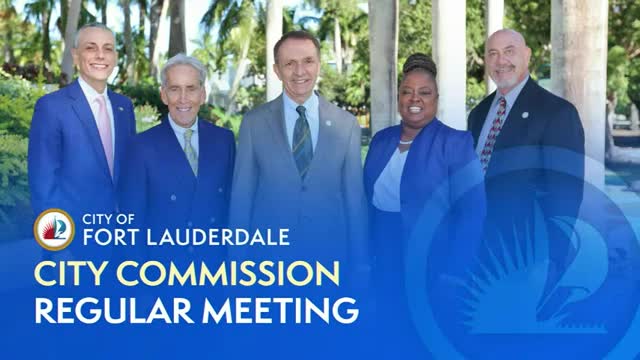Commission approves two radio-system purchases as debate continues over building radio coverage and condo costs
Get AI-powered insights, summaries, and transcripts
Subscribe
Summary
The Fort Lauderdale City Commission approved two purchases for public-safety radio infrastructure on Oct. 23, 2025, while commissioners and residents pressed staff on why condominium owners are being held responsible for improving in‑building two‑way radio coverage required by the Florida Fire Prevention Code.
The Fort Lauderdale City Commission on Oct. 23 approved two purchases intended to support public‑safety radio communications — a portable tower trailer and maintenance and support for the city’s Motorola trunked radio system — while commissioners pressed staff for more work on why condo owners are bearing costs to fix in‑building radio coverage.
The purchases were approved as consent items CP2 and CP3. CP2 authorizes the purchase of a mobile emergency response support “portable tower trailer” intended for deployment during incidents; CP3 is a proprietary maintenance and support agreement for the city’s Motorola core (computer‑aided dispatch and trunked radio) system. Both items passed on roll calls in which all commissioners voted yes for the purchases.
Commissioner Steve Glassman, who pulled the items for discussion, said the purchases themselves were not her primary concern but that the city must address recurring failures of two‑way radio testing inside condominium buildings without placing the full financial burden on unit owners. “If our police and fire are having issues with communicating with each other, that's not the fault or the responsibility of the homeowners in condominium buildings,” Glassman said during the meeting. She cited examples of buildings that passed one year and failed the next and said condominium associations are receiving notices that could lead to six‑figure repair estimates.
Assistant City Manager Chris Cooper told commissioners the Florida Fire Prevention Code places the burden on property owners to provide adequate two‑way radio communication inside certain buildings. “The state through the Florida Fire Prevention Code places the burden on the property owners of certain properties, so typically condos and those types of buildings, to make sure that there's adequate 2‑way radio communication for public safety available within their building,” Cooper said.
Fire Chief Stephen Golan told the commission the city documents and follows a process in which a firefighter’s radio “bonk” (loss of signal) reported during a call triggers a follow‑up review by the BDA (bi‑directional amplifier) team. Chief Golan also reported citywide figures: of about 483 high‑rise buildings in Fort Lauderdale, 95 had been cited for deficiencies in radio communications, roughly 19 percent, according to staff statements at the meeting.
IT Director Ron McKenzie said the portable tower trailer approved under CP2 is intended for incident response and would not solve in‑building signal penetration. “The answer to your question is no. That will not penetrate through the building,” McKenzie said. He and staff said larger, systemwide upgrades are underway: a P25 procurement package (the interoperable digital radio standard) is being redrafted by the city’s consultant and is expected to go out early in the year.
Commissioners asked staff to explore options that could relieve condominium owners’ costs. Vice Mayor John C. Herbst asked whether the city could use excess funds in the building permit fund to offset costs; staff said they were exploring that possibility and that the city attorney’s office would provide a legal opinion on whether permit fee balances could be used. Commissioner Glassman said she would continue outreach to state lawmakers and the state fire marshal to determine whether this is a Fort Lauderdale‑specific problem.
Outcome and next steps: Both CP2 (portable tower trailer purchase) and CP3 (Motorola system maintenance/support) were approved by roll call. Staff said they will continue outreach to other municipalities, expedite education and procurement processes, and report back to the commission. Staff also said they are compiling and expanding a list of affected properties (a process that already identified high‑rise citations) and will include schools and other facilities in that list.
Why this matters: Two‑way radio capability inside large, hardened buildings is required by state fire‑safety rules; inadequate in‑building coverage can put first responders at risk. Commissioners said residents and condo owners are receiving orders and invoices without clear consensus on the cause or the best technical remedy, elevating concerns about fairness and financial burden.
Votes at a glance: CP2 (purchase of mobile emergency response support portable tower trailer) — motion moved by Commissioner Steve Glassman; seconded (not specified in record); vote: Yes 5–0. CP3 (proprietary purchase of maintenance/support for Motorola trunk radio system) — motion moved by Commissioner Steve Glassman; seconded (not specified); vote: Yes 5–0.
Speakers quoted or referenced in this article include Commissioner Steve Glassman; Chris Cooper, assistant city manager; Ron McKenzie, IT director; and Fire Chief Stephen Golan. Staff committed to report back with a legal opinion on possible use of building permit funds, expanded lists of affected buildings, and progress on the P25 procurement.
